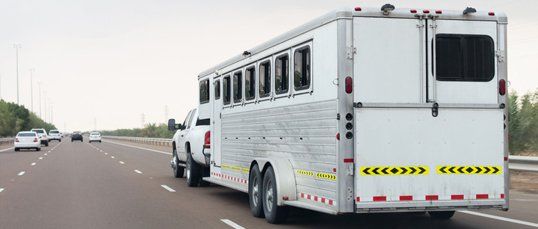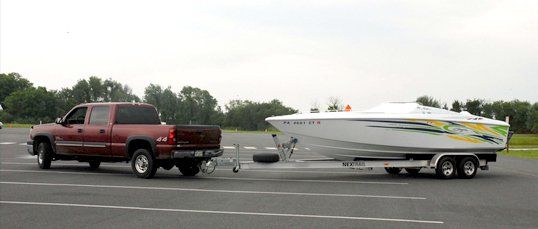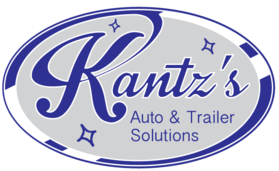Steve's Tips and Deals
FREE Estimates | Over 50 Years of Experience
FREE EstimatesOver 50 Years of Experience
Contact Us for a FREE Estimate
SAVE Time and Money With Towing and Trailering Tips
Read our tips and take advantage of our periodic deals to save you time and money on future service at Kantz's Auto & Trailer Solutions.

Safe Towing Tips for Your Spring and Summer Adventures
With Spring approaching, it won’t be long until you are connecting your camping trailer to escape for a weekend or hauling your boat to a favorite fishing spot.
Before you hitch any trailer to your vehicle and hit the road, make sure you review these important tips regarding tow safety.
Check Your Towing Capacity Limits
Review the towing capacity of your vehicle to make sure it is capable of handling the weight of your trailer and as well your trailer and vehicle’s total loaded weight limits.
Exceeding the maximum towing capacity can result in dangerous handling, insufficient braking performance, or serious damage to the vehicle’s suspension, engine, and drivetrain.
Also, make sure your trailer hitch is capable of handling your trailer’s loaded weight. Your hitch should be labeled with the maximum trailer and maximum tongue weights it can safely support.
Properly Pack Your Trailer
It is very important to properly store and secure cargo in your trailer. Roughly 60% of the trailer’s load should be placed in the front half of the trailer and be evenly distributed on the left and right sides of the trailer. Load your cargo so that it results in a tongue weight on conventional hitch trailers that is between 10%-15% of the total weight of the loaded trailer. All cargo should be secured to prevent the load from shifting.
Check Your Tires
Check both your tow vehicle and trailer tires for proper inflation. Improperly inflated tires can negatively affect handling. Underinflated tires can reduce gas mileage and contribute to blowouts if tire temperatures get too high. Refer to the tire pressure label placed in the driver’s doorjamb for proper inflation pressures for the tow vehicle. Don’t forget the spare tire.
Check Your Lights
Trailer tail lights and marker lamps should be checked and in good working order. Accidents can occur if the tail lights are not working or are improperly connected. Have someone stand behind the vehicle while it is in park to check to see that the turn signals, tail lights, and brake lights function properly.
Check Your Brakes
Smaller, lighter trailers may not need trailer brakes, but heavier trailers or those designed to carry heavier loads will usually incorporate a trailer brake system. Whether your trailer is equipped with hydraulic surge brakes or electric brakes, make sure the emergency “breakaway” cable is properly attached to your tow vehicle.
Adjust Your Mirrors
Check to make sure your side view mirrors are adjusted to create a clear view that extends to the end of the trailer. Some vehicle-trailer combinations may require mirrors specifically designed for towing that extend to expand the mirror’s viewing area.

Boat Trailering Safety Tips
Here are 10 tips for getting that boat of yours to the lake safely.
- Know the trailer weight, tongue weight, and combination weight ratings as they apply to your vehicle and trailer. Be careful not to exceed these ratings to avoid damage to your vehicle and trailer and to stay safe on the road.
- Disconnect your trailer wiring prior to backing the boat trailer down a launch ramp, especially if your trailer uses incandescent bulbs. Cold water on a hot lamp can cause the glass to break. Don’t forget to reconnect and check your wiring and lights once you are out of the water.
- Distribute the boat’s weight evenly when loading it onto the trailer. Winch the boat forward as far as it can go and make sure the trailer bunks or rollers are evenly supporting the weight.
- Securely strap the boat to the trailer before heading out on your trip.
- Adjust the mirrors properly. Install extended side view mirrors, if needed.
- Inspect the lights on your boat trailer and see that they are working properly.
- Check tires for proper inflation and that they are in good condition.
- With the extra weight you are pulling, allow for longer braking distances. Slow down and do not exceed the speed ratings of your tires on either your vehicle or trailer.
- Use the proper hitch for the trailer you are pulling. Bumper hitch towing capacities vary depending on their class rating. Make sure your hitch can handle the load you are pulling.
- Be extra observant of other drivers when driving with a boat in tow. Impatient drivers can cause accidents when trying to pass a slower-moving vehicle that is towing a boat.
For Your
FREE Estimate
on Any of Our Services,
Call 765-742-5058
Same-day estimates
are available.
Kantz's Auto & Trailer Solutions LLC
650 Marion St. | Lafayette, IN 47904
765-742-5058 | skantz831@gmail.com
